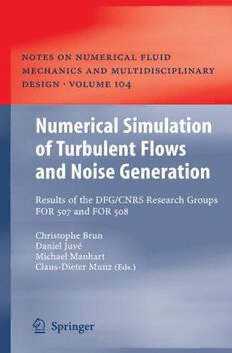Download Numerical Simulation of Turbulent Flows and Noise Generation: Results of the DFG/CNRS Research Groups FOR 507 and FOR 508 PDF Free - Full Version
Download Numerical Simulation of Turbulent Flows and Noise Generation: Results of the DFG/CNRS Research Groups FOR 507 and FOR 508 by Michael Schlegel, Bernd R. Noack, Pierre Comte, Dmitry Kolomenskiy, Kai Schneider (auth.), Christophe Brun, Daniel Juvé, Michael Manhart, Claus-Dieter Munz (eds.) in PDF format completely FREE. No registration required, no payment needed. Get instant access to this valuable resource on PDFdrive.to!
About Numerical Simulation of Turbulent Flows and Noise Generation: Results of the DFG/CNRS Research Groups FOR 507 and FOR 508
Large Eddy Simulation (LES) is a high-fidelity approach to the numerical simulation of turbulent flows. Recent developments have shown LES to be able to predict aerodynamic noise generation and propagation as well as the turbulent flow, by means of either a hybrid or a direct approach. This book is based on the results of two French/German research groups working on LES simulations in complex geometries and noise generation in turbulent flows. The results provide insights into modern prediction approaches for turbulent flows and noise generation mechanisms as well as their use for novel noise reduction concepts.
Detailed Information
| Author: | Michael Schlegel, Bernd R. Noack, Pierre Comte, Dmitry Kolomenskiy, Kai Schneider (auth.), Christophe Brun, Daniel Juvé, Michael Manhart, Claus-Dieter Munz (eds.) |
|---|---|
| Publication Year: | 2009 |
| ISBN: | 9783540899556 |
| Pages: | 344 |
| Language: | English |
| File Size: | 20.534 |
| Format: | |
| Price: | FREE |
Safe & Secure Download - No registration required
Why Choose PDFdrive for Your Free Numerical Simulation of Turbulent Flows and Noise Generation: Results of the DFG/CNRS Research Groups FOR 507 and FOR 508 Download?
- 100% Free: No hidden fees or subscriptions required for one book every day.
- No Registration: Immediate access is available without creating accounts for one book every day.
- Safe and Secure: Clean downloads without malware or viruses
- Multiple Formats: PDF, MOBI, Mpub,... optimized for all devices
- Educational Resource: Supporting knowledge sharing and learning
Frequently Asked Questions
Is it really free to download Numerical Simulation of Turbulent Flows and Noise Generation: Results of the DFG/CNRS Research Groups FOR 507 and FOR 508 PDF?
Yes, on https://PDFdrive.to you can download Numerical Simulation of Turbulent Flows and Noise Generation: Results of the DFG/CNRS Research Groups FOR 507 and FOR 508 by Michael Schlegel, Bernd R. Noack, Pierre Comte, Dmitry Kolomenskiy, Kai Schneider (auth.), Christophe Brun, Daniel Juvé, Michael Manhart, Claus-Dieter Munz (eds.) completely free. We don't require any payment, subscription, or registration to access this PDF file. For 3 books every day.
How can I read Numerical Simulation of Turbulent Flows and Noise Generation: Results of the DFG/CNRS Research Groups FOR 507 and FOR 508 on my mobile device?
After downloading Numerical Simulation of Turbulent Flows and Noise Generation: Results of the DFG/CNRS Research Groups FOR 507 and FOR 508 PDF, you can open it with any PDF reader app on your phone or tablet. We recommend using Adobe Acrobat Reader, Apple Books, or Google Play Books for the best reading experience.
Is this the full version of Numerical Simulation of Turbulent Flows and Noise Generation: Results of the DFG/CNRS Research Groups FOR 507 and FOR 508?
Yes, this is the complete PDF version of Numerical Simulation of Turbulent Flows and Noise Generation: Results of the DFG/CNRS Research Groups FOR 507 and FOR 508 by Michael Schlegel, Bernd R. Noack, Pierre Comte, Dmitry Kolomenskiy, Kai Schneider (auth.), Christophe Brun, Daniel Juvé, Michael Manhart, Claus-Dieter Munz (eds.). You will be able to read the entire content as in the printed version without missing any pages.
Is it legal to download Numerical Simulation of Turbulent Flows and Noise Generation: Results of the DFG/CNRS Research Groups FOR 507 and FOR 508 PDF for free?
https://PDFdrive.to provides links to free educational resources available online. We do not store any files on our servers. Please be aware of copyright laws in your country before downloading.
The materials shared are intended for research, educational, and personal use in accordance with fair use principles.

